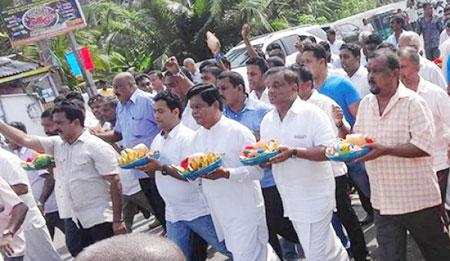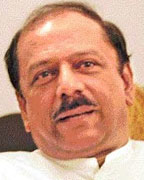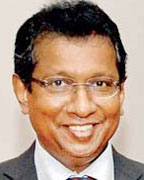Storm over FCID tea cup
by Ranil Wijayapala
The Financial Crimes Investigation Division (FCID), subject to much
criticism due to the nature of the investigations it carries out against
those responsible for financial irregularities during the Mahinda
Rajapaksa regime, completes its first anniversary this month.
 |
|
Members of the joint
opposition seek divine assistance to defeat the FCID at a temple
in Ratnapura Pic: Courtesy asianmirror.lk |
Though the setting up of the FCID was gazetted on February 14, 2015
following the Cabinet decision taken two days earlier, the Division
proper came into operation on February 26, with the then Minister of
Public Security and Law and Order , John Amarathunga, ceremonially
opening the office at Kalawil Place, Colombo-03.
One would think the legality of the Division, was a non-issue. Yet
the arrest of Lieutenant Yoshitha Rajapaksa, the second son of former
President and now the Kurunegala District UPFA MP, Mahinda Rajapaksa,
has turned the FCID into a ‘whipping boy’ for the self declared ‘joint
opposition’, who have embarked on an aggressive campaign to discredit
the investigative body and cast doubts about its legality.
Their campaign took a brief albeit twist detour last week when the
members of the ‘joint opposition’ sought divine assistance in their
discrediting endeavour, and smashed coconuts at the Seenigama Devalaya,
a place famous among the vengeful seeking to invoke divine wrath on any
and all that have done them wrong.
Political influence
The two pronged ‘joint opposition’ attack on the FCID questions the
legality of it formation and the political influence it wields. Both
issues are dismissed by the government, other political parties and
civil organisations in the forefront of anti corruption campaign, all of
who support the FCID and its ongoing inquiries as they think it has been
established within the legal framework of the country.
Technically the law enforcement agency of the government and
functions a subsidiary agency of Sri Lanka Police Service, the FCID
comes under the direct purview of the Inspector General of Police (IGP).
Like any other division of the Police Department, established in terms
of the provisions of Section 55 of the Police Ordinance, with the
approval of the Cabinet of Ministers, cases investigated by the FCID are
those referred to it by the IGP for investigations.
The criticism levelled against the FCID is based on the gazette
notification on the setting up of the Division and the manner in which
complaints are referred to the Deputy Inspector General in charge of the
FCID by the Anti Corruption Committee Secretariat (ACCS). The clause
that the Secretariat can refer special cases to the DIG in charge of the
FCID has been excessively highlighted by the ‘joint opposition’ and is
the basis for their criticism.
As explained by government in May 2015, the ACCS was established on a
Cabinet decision to co-ordinate and facilitate the functions of the Anti
Corruption Committee (ACC), a Cabinet Sub-Committee headed by the Prime
Minister, setup, also a decision taken by the Cabinet, on January 21,
2015. The ACC is a mechanism set up by the Executive Council established
during 100-day program of the cohabitation government formed after
Maitiripala Sirisena was elected President.
Facilitate inquiries
However, the Executive Council and the Anti Corruption Committee are
both non-existent at present, although the Anti Corruption Committee
Secretariat continues to coordinate and facilitate inquiries into public
complaints on corruption.
According to the government explanation, neither the Financial Crimes
Investigation Division of the Police Department nor the Anti-Corruption
Committee Secretariat are controlled by the Cabinet Sub-committee on
Anti-Corruption by any means, although the progress of the
investigations carried out not only by the FCID but also by the other
law enforcement agencies is reviewed once a week so as to ensure
effective law enforcement.
Explaining the exact situation relating to the Anti Corruption
Committee Secretariat, Director Ananda Wijepala, told the Sunday
Observer their activities do not, in any manner, influence the
investigations conducted by the FCID.
“Whatever the terms included in the gazette notification, the
Secretariat does not refer any case directly to the DIG in charge of the
FCID. The cases are always referred to the IGP, who then refers them to
the FCID for investigations,” he elaborated.
The role of the Anti Corruption Committee Secretariat is to receive
all sorts of the complaints from the public and forward them to the
relevant agencies for inquiries, he said, adding that one Additional
Solicitor General from the Attorney General’s Department is tasked with
reviewing the complaints and recommending to which agency it should be
referred to.
“There is no politics involved in this process. All the complaints
the Secretariat receive from various political parties and also against
government ministers have been referred for inquiries and
investigations,” he claimed.
Complaints received
According to senior Police officers attached to the FCID, the
Division not only investigates the complaints received through the Anti
Corruption Committee Secretariat, they also inquire into complaints
received by the Police stations across the country and those directly
received by the IGP.
The gazette notification issued on the setting up of the FCID is not
the law governing it, but the usual procedures of the Police Department
is adopted when conducting investigations, said a senior FCID official
on conditions of anonymity, adding, “Therefore, no one can point finger
at us for conducting inquiries on the directives of the government.”
According to FCID sources, during the past one year, the FCID has
received more than 230 complaints. They have completed investigations on
35 complaints at present. Four cases have already been filed against
those responsible for financial irregularities.
Four cases
Cases have so far been filed against former Minister of Economic
Development, Basil Rajapaksa, on the misappropriation of Divineguma
Development Department fund, former Minister Johnston Fernando for the
misappropriation of Sathosa funds for election campaigning, former
Presidential Secretary Lalith Weeratunga and former Chairman of
Telecommunication Regulatory Commission, Anusha Pelpita for using Rs.
600 million in public funds to distribute ‘sil redi’ during the
Presidential Election campaign.
The case against the former Presidential Secretary was taken up on
Friday for its first hearing and other cases will also be taken for
hearing in the future.
The FCID is awaiting directions from the Attorney General’s
Department on 31 other cases, investigations into which have been
finalised. Among the pending cases awaiting directions from the AGs
Department, is the case against Gampaha District UPFA MP, Prasanna
Ranthunga, on land issue, former Minister Wimal Weerawansa for using
Rs.14 million to print diaries, former Defence Secretary Gotabhya
Rajapaksa for using Rs.91 million for the construction of a monument in
memory of his mother and father in Weeraketiya, Minister Anura
Priyadarshana Yapa for allegedly misusing Ceylon Petroleum Corporation
funds, former Sports Minister Mahindananda Aluthgamage for
misappropriating Rs.39 million, the former Port Authority Chairman for
releasing 573 Port Authority employees for election campaign work during
the last Presidential Election.
The FCID, though having a skeleton staff of 65 investigating officers
including five ASPs, five Chief Inspectors and 11 Inspectors, continue
to conduct investigations under the directive of Deputy Inspector
General Ravi Waidyalankara and FCID Director, ASP Aruna Premashantha.
Dismissing the allegations of the ‘joint opposition’ the FCID
officials point out that if their investigations are driven on political
directions they could have made lot of arrests by now, based on the
evidence they have gathered. What they are doing, the officials claim,
is conducting investigations in a proper and professional manner to
ensure that the people responsible for crimes are arrested in accordance
with the prevailing laws of the country. They also point of that if the
legality of the FCID is challenged, the Supreme Court will give its
verdict after considering around 10 petitions filed in the Supreme Court
challenging it.
Govt should follow normal laws - Dinesh Gunawardena, UPFA MP
 The
FCID, which was set up a year ago is based on the gazette notification
issued to empower special regulations under the Police Ordinance. It
also mentions political interference in the conduct of the FCID, if one
reads the regulations. The Prime Minister also advises by way of a
committee in the FCID, which never happened before except during the
draconian emergency regulations used by the UNP in the dark days of the
80s and 90s. The
FCID, which was set up a year ago is based on the gazette notification
issued to empower special regulations under the Police Ordinance. It
also mentions political interference in the conduct of the FCID, if one
reads the regulations. The Prime Minister also advises by way of a
committee in the FCID, which never happened before except during the
draconian emergency regulations used by the UNP in the dark days of the
80s and 90s.
Our position is there are enough laws in the land under which any
investigation can be done in the accepted norms on democracy and human
rights. Therefore any investigation should be brought under the normal
laws that exist and action to be taken accordingly, if there are grounds
for such action.
I must say this was not agreed to by the parliamentary group of the
UPFA chaired by the President when he met us when the 19th Amendment was
discussed. The government has not kept to any of its promises. This is
not only political witch hunting, public officials and private sector
officials are also being dragged under this special regulation.
Therefore, we call upon the government to follow the normal laws that
have been approved by the land in the normal course of justice for which
Sri Lanka has a long experience and respect.
The joint opposition never said not to inquire under the laws which
are already there. There are enough laws under which the complaints can
be inquired into.
There is no question about FCID’s legality -J.C. Weliamuna
 Those
who are protesting against the FCID are doing so not because of the
legality but because the mandate given to it to investigate large scale
corruption. FCID is yet another Police Division established by the IGP
in terms of the Police Ordinance after Cabinet has given its approval.
So there is no question about its legality, it is like any other Police
Division where investigations are conducted by the Police officers under
normal law and there are no special laws to investigate those crimes. Those
who are protesting against the FCID are doing so not because of the
legality but because the mandate given to it to investigate large scale
corruption. FCID is yet another Police Division established by the IGP
in terms of the Police Ordinance after Cabinet has given its approval.
So there is no question about its legality, it is like any other Police
Division where investigations are conducted by the Police officers under
normal law and there are no special laws to investigate those crimes.
The FCID is investigating the complaints that are coming directly to
the IGP or to the Anti Corruption Committee Secretariat and that
Committee Secretariat basically comprises civil servants who understand
financial frauds. “They are not investigating, but what they are doing
is looking into the complaints and referring them to the IGP and he
refers them to the relevant division of the Police Department. That is
not uncommon.
There should not be any difference between the previous government
and this government. They should not only take the last government to
task but I am sure once this institution is well established, which is
still happening, they will go into the complaints against this
government also
Financial investigations are not like investigating murders or any
other crimes. It takes sometimes months and years. It is a very complex
diligent procedure and they are taking that fairly seriously and I am
satisfied of the way they are working and CID and FCID are functioning. |

